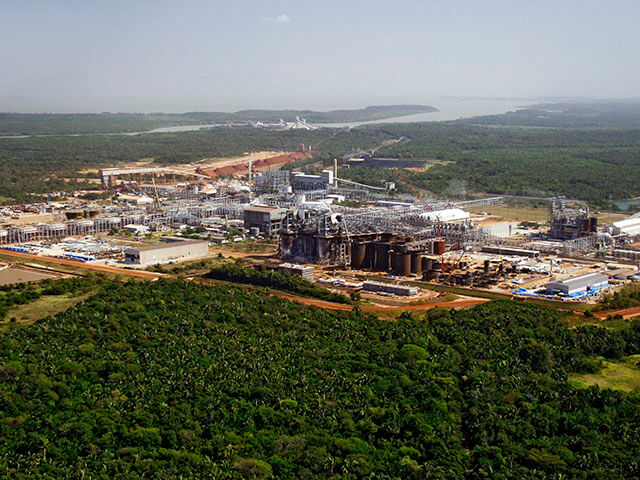
Alcoa Corp. and South32 Ltd. are proceeding with the restart of an idled aluminum smelter in Brazil after prices of the metal surged to a 13-year high amid Chinese output cuts. Alcoa shares tumbled following the announcement.
Alumar, a complex in the country’s northeast that’s been fully curtailed since 2015, is set to produce its first molten metal in the second quarter of next year, Alcoa said in a statement Monday. The top U.S. aluminum producer’s share of the restart cost will be about $75 million.
The decision, mentioned as a possibility in May, comes as one of the first signs that a massive rally is finally bringing more capacity on line. Used in everything from cars to beer cans, aluminum has nearly doubled over the past 18 months, transforming the fortunes of a long-struggling industry.
“The aluminium market remains tight, with metal availability scarce on the back of Chinese production cuts, port delays and shipping issues,” Colin Hamilton, a commodity analyst at BMO Capital Markets, said in a note to clients. “We expect the resultant ongoing price rally to stimulate capacity increases, the first of which was seen yesterday with Alcoa announcing the restart.”
Aluminum has nearly doubled over the past 18 months, transforming the fortunes of a long-struggling industry
Alcoa shares fell as much as 8.2%, the biggest intraday loss in a month. The stock led declines in the Bloomberg Americas Mining Index.
Energy restrictions are part of the supply constraints. Alumar will be powered with 100% renewable energy by 2024 as a protracted drought in Brazil limits hydro-power.
The smelter, which is set to ramp back up by the fourth quarter of 2022, has an annual capacity of 447,000 metric tons, including Alcoa’s 268,000-ton share. That will mean about 80% of the company’s 2.99 million tons of global smelting capacity will be operating.
To be sure, surging energy costs are making it more difficult for higher cost smelters to restart globally. Aluminum’s rally seemed ripe for producers to switch on idled capacity to catch a windfall in profits, but the process uses an immense amount of energy. A single plant can use as much electricity as it take to power a major city.
The restart will be shot in the arm for the industry in Brazil. The bauxite-rich country’s once cheap and abundant hydroelectricity turned it into the sixth-largest aluminum producer in the world. That ranking has now slipped to 15th.
“Our restart decision is based on an analysis that shows the smelter can be competitive throughout all cycles, leveraging the co-located refinery, a strong workforce, and competitive, renewable power arrangements,” Alcoa Chief Operating Officer John Slaven said.
Still, Alumar represents a tiny fraction of global aluminum production. Researcher Harbor Intelligence forecasts output to total about 70 million tons in 2022. China alone will account for about 57% of that metal making.
(By James Attwood, with assistance from Joe Deaux)
Comments